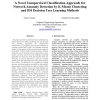4650 search results - page 895 / 930 » Generating and evaluating evaluative arguments |
SIGMOD
2010
ACM
13 years 7 months ago
2010
ACM
One useful feature that is missing from today’s database systems is an explain capability that enables users to seek clarifications on unexpected query results. There are two t...
TJS
2010
13 years 7 months ago
2010
This paper presents a novel host-based combinatorial method based on k-Means clustering and ID3 decision tree learning algorithms for unsupervised classification of anomalous and ...
WABI
2010
Springer
13 years 7 months ago
2010
Springer
Quantification of selective pressures on regulatory sequences is a central question in studying the evolution of gene regulatory networks. Previous methods focus primarily on sing...
CG
2010
Springer
13 years 7 months ago
2010
Springer
Generating, grouping, and labeling free-sketch data is a difficult and time-consuming task for both user study participants and researchers. To simplify this process for both part...
ACSAC
2010
IEEE
13 years 6 months ago
2010
IEEE
Instruction-set randomization (ISR) is a technique based on randomizing the "language" understood by a system to protect it from code-injection attacks. Such attacks wer...

